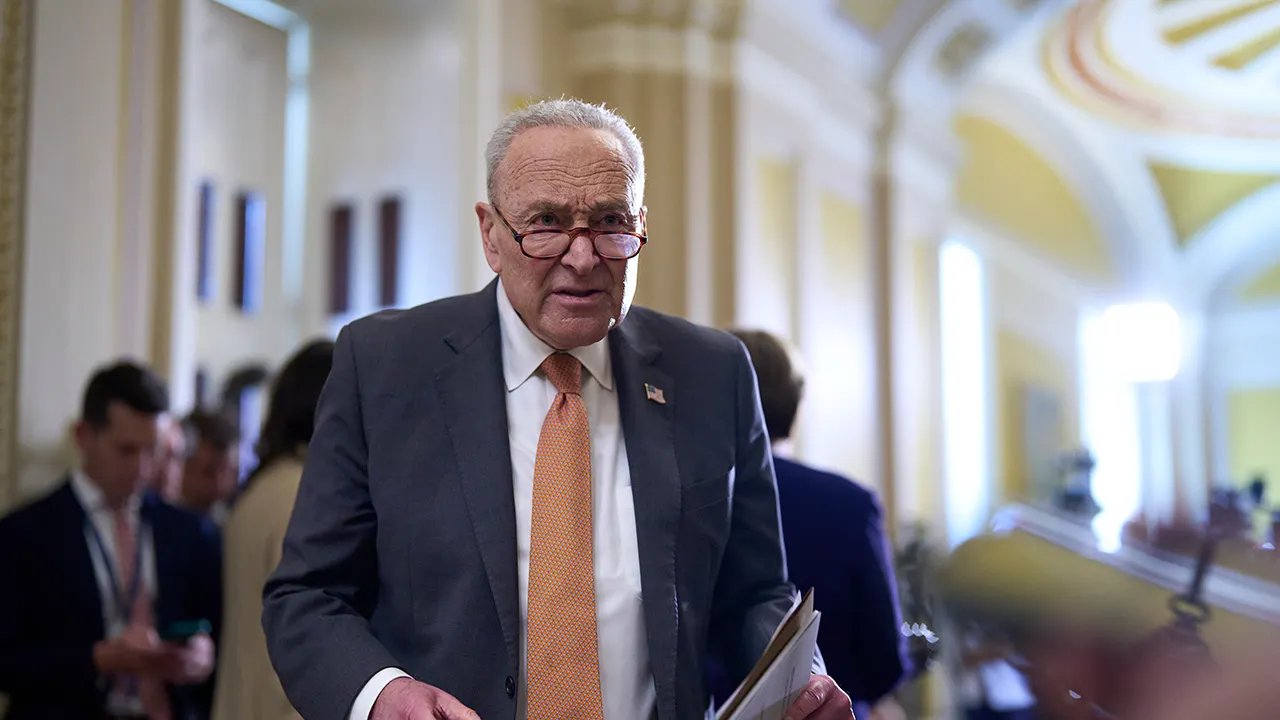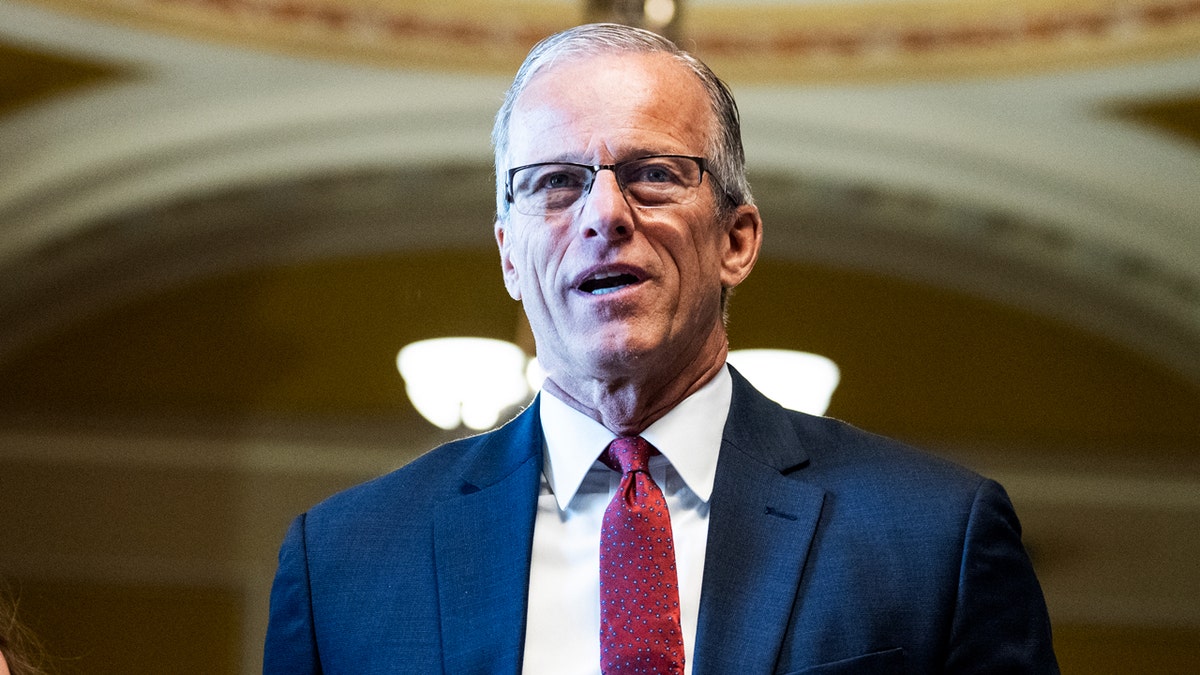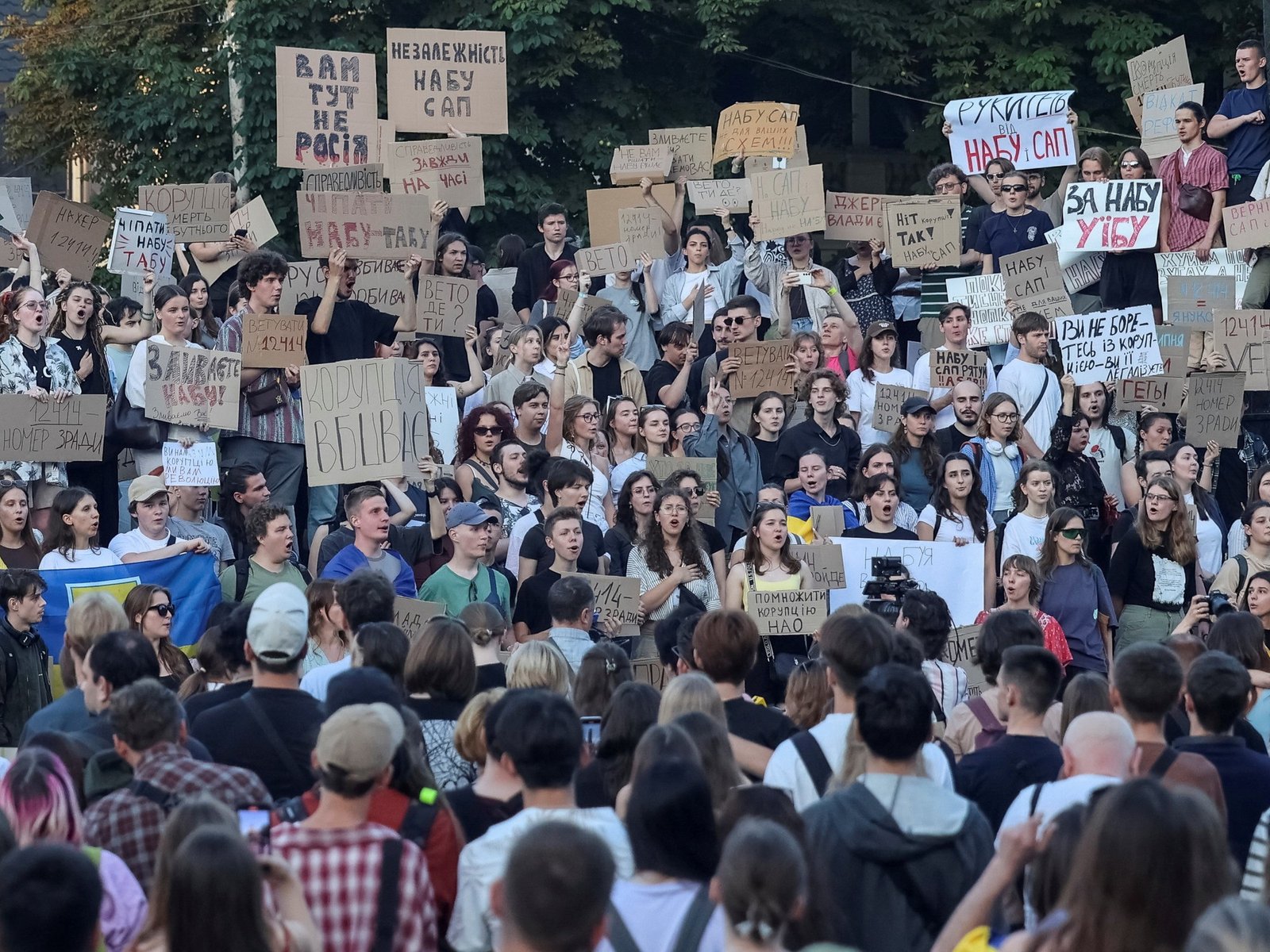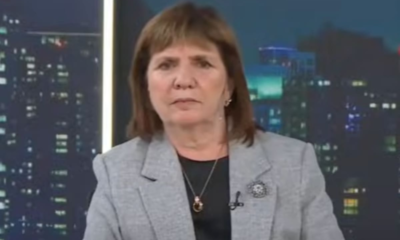INTERNACIONAL
Antisemitism spiking around the world, ADL task force finds in its 1st-ever global report

The Anti-Defamation League (ADL) has released its first-ever J7 Annual Report on Antisemitism as the world prepares to mark the 80th anniversary of Victory in Europe (VE) Day.
The report details the rise in antisemitism seen in countries that have the largest Jewish populations outside Israel, including the U.S., the U.K., Argentina, Canada, France, Germany and Australia.
The J7 Task Force was founded in July 2023, just months before Hamas launched its deadly attacks on Israel. In the wake of the massacre, the ADL has noted an uptick in antisemitic incidents and sentiments around the world.
Anti-Israel demonstrators deface property on the day of Israeli Prime Minister Benjamin Netanyahu’s address to a joint meeting of Congress on Capitol Hill in Washington, D.C., on July 24, 2024. (Katie Pavlich)
ANTISEMITIC INCIDENTS BREAK RECORD FOR 4TH STRAIGHT YEAR, ADL FINDS
From 2021 to 2023, antisemitic incidents increased by 11% in Australia, 23% in Argentina, 75% in Germany, 82% in the U.K., 83% in Canada, 185% in France and 227% in the U.S., according to the ADL’s report. Additionally, the organization noted a «troubling» pattern in antisemitic incidents per Jewish capita in the J7 countries, including more than 38 incidents per 1,000 Jewish residents in Germany in 2023. Additionally, in Australia, incidents per Jewish capita quadrupled from 2023 to 2024.
The J7 Task Force report reveals common themes across all nations, such as increases in violent attacks, spikes in antisemitic rhetoric online and growing feelings of fear and insecurity among Jews.
In the report, the rising antisemitism in each of the J7 countries was documented by the Jewish communities directly impacted.
Argentina
The Delegación de Asociaciones Israelitas Argentinas (DAIA) found that antisemitism had become deeply embedded in social media and academic institutions. Argentinian Jewish students are reportedly choosing schools «based on whether or not they will be a target of antisemitic incidents, both from their fellow students and from their professors,» according to DAIA. The organization recommends more «work and engagement» in combatting antisemitism in academia.
In 2023, Argentina saw a 44% increase in antisemitic incidents compared to 2022. Like many other countries included in the report, the country saw a rise in antisemitism and anti-Zionism following Hamas’ Oct. 7 attacks.
Additionally, DAIA noted that Argentinian President Javier Milei’s strong support of Israel and the U.S. has led to «an increase in antisemitic and other conspiratorial rhetoric.»
DAIA also found some bright spots in Argentina, noting that 60% of Argentinians, especially those aged 25-34, have a favorable view of Israel and just 7% favor boycotting Israeli products and businesses. This could be because Argentina has felt the impact of a terrorist organization that has also attacked Israel. Hezbollah carried out two deadly bombing attacks in Buenos Aires, one in 1992 at the Israeli Embassy and another in 1994 at the AMIA-DAIA Jewish Center.

«Free Palestine» graffiti is seen on a fence praising the Oct. 7 Hamas massacre against Israelis. (Executive Council of Australian Jewry )
AUSTRALIA’S JEWISH COMMUNITY ALARMED BY RISING ANTISEMITISM
Australia
The Executive Council of Australian Jewry’s (ECAJ) report, which covers Oct. 1, 2023-Sept. 30, 2024, showed a sizable 316% increase in antisemitic incidents. In the 12-month period the ECAJ studied, it found 2,062 antisemitic incidents compared to 495 incidents in the previous year. In the decade prior, the number of antisemitic incidents each year ranged from 190 to 495.
ECAJ cited Dr. Adina Bankier-Karp and Dr. David Graham’s survey, «Australian Jews in the Shadow of War,» which found that 64% of Australian Jews felt that antisemitism was «very much» a big problem in the country. This, according to the report, is 10 times higher than the response in 2017.
The Australian federal government in 2024, as well as many state governments, banned hate symbols such as swastikas and the Nazi salute. Symbols of terrorist organizations were also banned. However, ECAJ said it does not believe these laws do enough to combat «post-Oct. 7 sources of antisemitism.»
«While these laws are welcomed, they are not addressing the post-October 7 sources of antisemitism in Australia which makes up the majority of incidents, nor will the laws counter anti-Jewish attitudes and incidents,» ECAJ wrote in the report.
Canada
The report on Canada was compiled by the Centre for Israel and Jewish Affairs (CIJA). The organization said Canada’s main challenges include increased threats of violence and «anti- Israel actions taken by the federal government that display a double standard towards the Jewish state, such as the imposition of an arms embargo.»
While the data for 2024 is not yet available, CIJA noted that the 2023 statistics show «disturbing trends.» While Jews make up just 1% of the country’s population, 19% of reported hate crimes were motivated by antisemitism. Additionally, hate crimes against Jews increased by 71% from 2022 to 2023, according to CIJA.
In the report, CIJA called out the Canadian government’s «inaction» on antisemitism. The organization called for action and legal reform to help fight rising antisemitism.
Nearly all Canadian Jews, 98%, said antisemitism is a «serious or somewhat serious problem,» according to CIJA. Additionally, 82% said «Canada has become less safe for Jews» since Hamas’ Oct. 7 massacre.

Students and residents camp outside Northwestern University during an anti-Israel protest, expressing solidarity with Palestinians with banners in Evanston, Illinois, on April 27. (Jacek Boczarski/Anadolu via Getty Images)
France
Conseil Représentatif des Institutions Juives de France (CRIF) found clear links between antisemitic incidents and the ongoing Israel-Hamas war. According to CRIF, more than 30% of antisemitic incidents in 2024 included references to «Palestine.» French schools also saw antisemitic incidents more than quadruple, reaching 1,670 in the 2023-2024 academic year, compared to 400 the year before.
CRIF found that antisemitic incidents became more violent in 2024. These incidents included the rape and assault of a 12-year-old Jewish girl because of her «bad words on Palestine» and the arson and antisemitic graffiti at the Rouen synagogue.
The organization said it welcomed the French government’s adoption of a national plan to fight racism, antisemitism and discrimination. The plan was adopted in 2023 and is set to be implemented through 2026.
CRIF said in its report that many French Jews have stopped displaying or speaking about their religious identity out of fear. Even children steer clear of the topic to avoid harassment in school.
GLOBAL RISE IN ANTISEMITISM LEAVES JEWISH COMMUNITY ISOLATED, RABBI SAYS WORLD AT ‘A TIPPING POINT’
Germany
Zentralrat der Juden in Deutschland (ZJD) sounded the alarm over rising antisemitism, pointing out that «October 7, 2023, has massively accelerated a development that was already looming.» Antisemitism in Germany is not unique to one side of the political aisle, though ZJD points out the rise of Alternative für Deutschland (AfD) «poses a major challenge.»
AfD holds multiple positions that, if turned into reality, would make life extremely difficult for observant German Jews, including the banning of religious slaughter of animals, which could effectively make kosher meat illegal.
German police found 3,200 crimes from Jan. 1, 2024, to Oct. 7, 2024, were motivated by antisemitism. This comes after the Office on Research and Information on Antisemitism in Hessen found 3,000 antisemitic incidents between Oct. 7, 2023, and the end of that same year.
A January 2025 study by the Claims Conference found that approximately 40% of 18- to 29-year-olds in Germany did not know that more than 6,000,000 Jews were murdered in the Holocaust. However, the ADL’s 2024 Global 100 survey shows Holocaust distortion and denial is lower in Germany compared to other Western European nations.
ZJD concluded that ongoing debates in Germany surrounding social issues have direct impacts on the Jewish community.

Antisemitic hate on display at an anti-Israel protest in London. Antisemitism in the U.K. is hitting record levels since the Hamas terror attacks on Oct. 7. (Campaign Against Antisemitism on X)
ADL ALLEGES WIKIPEDIA EDITORS ENGAGING IN ‘COORDINATED CAMPAIGN’ AGAINST ISRAEL
The United Kingdom
The Board of Deputies of British Jews (the Board) said in its section of the report that antisemitism has dropped since Q4 2023 but still remains above pre-Oct. 7 levels. Meanwhile, British Jews are «finding everyday life in the U.K. an increasing challenge» with 25% of British Jews feeling unsafe in the country.
The Community Security Trust’s 2024 Antisemitic Incidents Report showed 3,528 antisemitic incidents in the U.K., representing an 18% decrease from the 4,296 incidents reported in 2023.
«Posters of Israeli hostages are regularly torn down, and in major cities the UK has faced weekly hate marches calling for Israel’s destruction,» the Board wrote. It also stated that the Institute of Jewish Policy Research called this phenomenon «ambient antisemitism.»
The Board acknowledged the government’s actions to fight antisemitism but said that statistics showed that further action was needed. «Enhanced law enforcement, stricter regulations on online hate speech, and comprehensive educational programs are essential to effectively combat antisemitic attitudes and behaviors,» the Board wrote.
Overall, the Board believes the U.K.’s three main areas of focus should be addressing antisemitic incidents, fighting online hate speech and restoring a sense of security among British Jews.
CLICK HERE TO GET THE FOX NEWS APP
The United States
The ADL and the Conference of Presidents of Major American Jewish Organizations worked together to compile a report on rising antisemitism in the U.S., noting the «alarming rise» in antisemitic incidents and attitudes.
In its 2024 antisemitism audit, which was released last month, the ADL identified 9,354 antisemitic incidents in 2024, a 5% increase from 2023 and a staggering 926% increase since it began tracking in 1979.
«Let’s be clear, antisemitism is an irrational hatred of individuals or institutions just because they are Jewish,» ADL CEO Jonathan Greenblatt told Fox News Digital upon the release of the audit. He also noted that «ADL has been conducting an annual audit of antisemitic incidents since the 1970s. And we’ve simply never seen numbers like this.»
The ADL and the Conference of Presidents of Major American Jewish Organizations found that «the groundswell of antisemitism in the United States shows no signs of abating.» In the report, both organizations said that the polarized political environment makes it hard to predict how antisemitism will develop.
INTERNACIONAL
Schumer, Democrats try to save face, blame GOP for possible government shutdown

NEWYou can now listen to Fox News articles!
Congressional Democrats are trying to get on the same page and display a unified front after threatening to derail the government funding process.
Senate Minority Leader Chuck Schumer, D-N.Y., and House Minority Leader Hakeem Jeffries, D-N.Y., met behind closed doors Tuesday night, along with the top Democrats in the House and Senate Appropriations Committees, to plot a course forward in the forthcoming government funding fight.
SENATE WEATHERS DEM OPPOSITION, ADVANCES FIRST GOVERNMENT FUNDING BILL
Senate Minority Leader Chuck Schumer, D-N.Y., turns to an aide during a news conference at the Capitol in Washington, D.C., on June 3, 2025. (AP Photo/J. Scott Applewhite)
The meeting came after Democrats in the upper chamber overwhelmingly supported the first government funding bill to hit the Senate floor, one that would fund military construction and Veterans Affairs. Ahead of the vote, Senate Democrats had signaled they may vote against the bill and further obstruct the appropriations process because of highly partisan legislation rammed through the upper chamber by Senate Republicans.
«We all want to pursue a bipartisan, bicameral appropriations process,» Schumer said. «That’s how it’s always been done, successfully, and we believe that, however, the Republicans are making it extremely difficult to do that.»
The meeting just off the Senate floor was meant to get congressional Democrats on board with a messaging plan over the next weeks and months ahead of the Sept. 30 deadline to fund the government.
CONGRESSIONAL REPUBLICANS FACE BRUISING BATTLE TO AVOID GOVERNMENT SHUTDOWN

Senate Majority Leader John Thune, R-S.D., is seen after the Senate luncheons in the U.S. Capitol on June 24, 2025. (Tom Williams/CQ-Roll Call, Inc via Getty Images)
It was also likely designed to prevent a repeat of the Democratic debacle in March, when Schumer broke with Jeffries and threatened to shutter the government before ultimately caving and providing Republicans the votes necessary to advance yet another government funding extension, known as a continuing resolution.
Republicans are quick to point out that when Schumer led the upper chamber, none of the House GOP’s spending bills made it to the floor — in Congress, the spending process begins in the lower chamber.
Since taking over earlier this year, Senate Majority Leader John Thune, R-S.D., has committed to returning to regular order, or passing each of the dozen spending bills to fund the government, and trying to get the appropriations process back to normal.
However, it’s a feat that hasn’t been successfully done in Washington since the late 1990s.
«Frankly, I think a lot of us around here think [this] is long overdue,» Thune said.
However, Democrats contend that their trust in Republicans is wearing thin after two major partisan bills, one being President Donald Trump’s «big, beautiful bill,» and the other the president’s $9 billion clawback package, were pushed through the chamber without any Democratic input.
‘BAIT AND SWITCH’: SCHUMER WARNS OF BITTER FUNDING FIGHT OVER GOP CUTS PLAN

Representative Hakeem Jeffries, a Democrat from New York, speaks during a news conference at the U.S. Capitol in Washington, D.C., on Feb. 6, 2025. (Tierney L. Cross/Bloomberg via Getty Images)
Thune argued that Senate Democrats were using the rescissions package to shut down the appropriations process and effectively shut down the government.
In the Senate, most bills that come to the floor require at least 60 votes to smash through the filibuster, meaning that most legislation requires bipartisan support to some extent.
Earlier this year, the House GOP produced a partisan government funding extension that was a tough pill for Senate Democrats to swallow, but they still ultimately opted to vote for it. This time around, they’re demanding more involvement in the process.
CLICK HERE TO GET THE FOX NEWS APP
Jeffries said that congressional Democrats would play ball if the process was «bipartisan and bicameral in nature» and put the onus of a partial government shutdown at the feet of congressional Republicans.
«House Republicans are, in fact, marching us toward a possible government shutdown that will hurt the American people,» he said.
However, House Speaker Mike Johnson, R-La., threw the responsibility on Democrats over whether the government would shutter or stay open come the end of September.
«They’re gaming out how they can shut the government down,» Johnson told Bloomberg Government.
INTERNACIONAL
Ucrania: el presidente Volodimir Zelenski enfrenta críticas y protestas por una nueva ley anticorrupción

Advertencia de funcionarios de la UE
Negociaciones en Estambul
Ucrania,Volodímir Zelenski,Rusia,Guerra Rusia-Ucrania
INTERNACIONAL
Trump admin official to meet with Israel, Qatar amid push for Gaza ceasefire

NEWYou can now listen to Fox News articles!
Special Envoy Steve Witkoff is expected to meet with Israeli and Qatari officials in Rome on Thursday as the U.S. pushes for a ceasefire deal in Gaza.
Hamas and Israel are engaging in indirect negotiations to end the war that has raged on for nearly two years. However, Witkoff’s itinerary depends on the progress made in the talks. If the parties make enough progress in Rome, Witkoff will reportedly travel to Doha to finalize the deal, according to Axios.
The outlet also reported that sources indicated the meeting in Rome could suggest that a deal is near — possibly just days away.
Earlier this month, Israel agreed to a U.S.-backed, 60-day ceasefire proposal that would lead to the end of the war. This deal includes a phased release of hostages, the withdrawal of Israeli troops from parts of Gaza and talks on ending the conflict, according to Reuters.
Special Envoy Steve Witkoff is expected to meet with Israeli and Qatari officials in Rome on Thursday to secure a deal to end the war in Gaza. (Dawoud Abo Alkas/Anadolu/Kevin Dietsch/Getty Images)
ISRAEL, HAMAS TALKS DRAG AS AID GROUP CHAIR TELLS UN TO STOP ACTING LIKE THE ‘MAFIA’
«My representatives had a long and productive meeting with the Israelis today on Gaza. Israel has agreed to the necessary conditions to finalize the 60 Day CEASEFIRE, during which time we will work with all parties to end the war. The Qataris and Egyptians, who have worked very hard to help bring peace, will deliver this final proposal. I hope, for the good of the Middle East, that Hamas takes this deal because it will not get better — IT WILL ONLY GET WORSE,» President Donald Trump wrote on Truth Social on July 1.

President Donald Trump holds a bilateral dinner with Israeli Prime Minister Benjamin Netanyahu, with Defense Secretary Pete Hegseth and Secretary of State Marco Rubio in attendance, at the White House in Washington, D.C., July 7, 2025. (REUTERS/Kevin Lamarque)
ISRAEL ACCEPTS TRUMP-LED CEASEFIRE PLAN THAT COULD END GAZA WAR WITHIN 60 DAYS
Trump appeared optimistic about the possibility of Israel and Hamas reaching a deal to end the war. On July 16, while signing the HALT Fentanyl Act, Trump thanked Witkoff, praising him for doing «a fantastic job» and said that there was «some good news on Gaza,» though he did not elaborate.

From left to right, Foreign Affairs Minister of Bahrain Abdullatif bin Rashid Al Zayani, Prime Minister of Israel Benjamin Netanyahu, President Donald Trump and Foreign Affairs Minister of the United Arab Emirates Abdullah bin Zayed bin Sultan Al Nahyan participate in the signing ceremony of the Abraham Accords on the South Lawn of the White House on Sept. 15, 2020, in Washington, D.C. (Photo by Alex Wong/Getty Images)
TRUMP PRESSURES ISRAEL TO END GAZA CONFLICT AS HE EYES ABRAHAM ACCORDS EXPANSION
If Trump can secure an end to the war, it could mean an expansion of the Abraham Accords, one of the signature efforts of Trump’s first administration, which saw Israel sign normalization agreements with the United Arab Emirates, Bahrain, Morocco and Sudan. However, Trump has yet to detail which countries would be added.
Israeli Minister of Foreign Affairs Gideon Sa’ar said on June 30 that Israel was «serious» about seeking an end to the conflict. He added that Jerusalem has an interest in «countries, such as Syria and Lebanon, our neighbors, to the circle of peace and normalization.»
CLICK HERE TO GET THE FOX NEWS APP
Fox News Digital’s Greg Wehner and Caitlin McFall contributed to this report.

 POLITICA3 días ago
POLITICA3 días agoExpulsada del Gobierno, Victoria Villarruel empieza a tomar distancia, pero no tiene proyecto político para este año

 POLITICA3 días ago
POLITICA3 días agoLa CGT evalúa adelantar a octubre el recambio de sus autoridades y define una movilización contra Milei

 POLITICA2 días ago
POLITICA2 días ago🗳️ El chamuyo de las elecciones en la Provincia: se postulan, pero no a asumen























